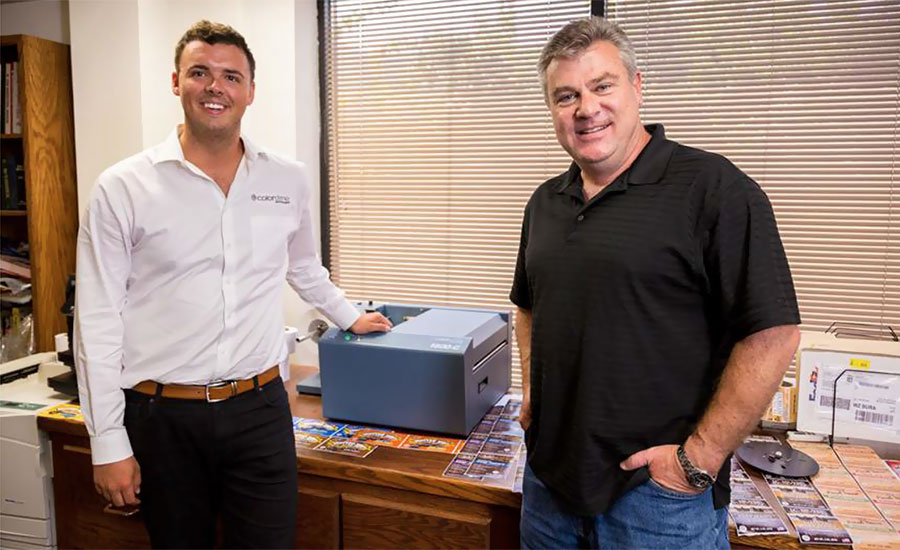The Sun Valley, California-based company manufactures and packages more than 90 brands of beef, ostrich, turkey, buffalo and venison jerky for sale throughout North America. With a product offering as large and diverse as Glenoaks Food has developed, the company is now using two Colordyne Technologies’ 1600 Series C (Continuous Roll) Industrial Class printers to produce sharp, crisp and accurate labels needed to support its hundreds of SKUs.
“The problem we’ve historically had with having more than 600 SKUs is that many of them have full art digital color labels we have to run that are always unique to the customers,” said John J.W. Fallon III, president of Glenoaks Food, Inc. “We have so many private label customers that we had to find an effective way to accommodate them on short runs and long runs.”
As owner of Glenoaks Food since 1996, Fallon has been witness to the food manufacturing industry reinventing itself in recent years as brands look to create a more personal one-on-one connection with its consumers – and one way to successfully accomplish that is through the personalization of their labels. As such, the business model of a converter printing thousands of the same labels is becoming outdated in certain applications. The rise of digital printing offers brand owners like Fallon an avenue to become more flexible in their printing needs to better accommodate short runs, while also effectively embracing this new trend of personalized communication with its customer base.
A good example of this practice in action is how Glenoaks is labeling jerky for a chain of microbreweries. Fallon said short runs of 1,000 labels are often divided among eight specific brands for the microbreweries – an action that is made possible thanks to digital printing.
“The brand-specific labels can’t be printed conventionally because they’d have to buy all of those plates, and that is not cost effective,” Fallon said. “But we can go into industries, such as microbreweries, and change flavors and other elements on the labels quickly, and that’s made possible due to our Colordyne printers.”
Colordyne’s 1600 Series C Industrial Class printers are designed to make print-on-demand applications more efficient, accurate and cost effective. Brand owners and converters discover that digital color printing allows them to reduce pre-printed inventories – lowering costs, waste and obsolescence – that take up valuable warehouse space. Colordyne digital color inkjet printers are powered by Memjet technology, which can print full variable color up to 1600 x 1600 dpi, and at throughput speeds up to 12 inches per second on Industrial Class printers. Memjet color printheads use “Waterfall” technology, which fires millions of ink drops per second to produce a label with quality that is second to none.
Prior to purchasing the 1600 Series C units, Glenoaks Food used a variety of platforms to print their labels in-house. But often that process took several days to complete, and the responsiveness and flexibility to their customers was not where Fallon wanted it to be.
With their Colordyne printers installed in January 2014, Glenoaks uses one to print the more colorful, full-art label for the front of the packages, while using the second for printing the backside labels with UPC and nutritional information. Fallon said he researched several other digital printers from many different manufacturers, but a common problem he found was that ink did not set fast enough, which affected the print quality of labels and led to added waste.
“I see the advertisements for many of Colordyne’s competitors, claiming they’re faster and the quality is better than those with Memjet technology, and that’s simply not true,” Fallon said. “I have tested them thoroughly; I don’t know why they can even make that claim.”
The versatility of the 1600 Series C units allows Fallon to print directly from platforms such as Adobe Photoshop, Adobe Illustrator, CorelDRAW and others.
“I can print labels from many programs,” he said. “I send them directly to the printer; I keep libraries of the PDF files so that other people can just send them directly to the printer as well.”
The ability to quickly print labels is also helpful when any new USDA regulations are mandated, which often require changes to the fine print on the labels. By reducing inventory and printing on demand, Fallon is able to edit copy on the labels to conform to new regulations, print new labels and have them ready for use the same day.
“Having this flexibility is very crucial to my business. When we have a regulation issue, or if a customer makes a special request, we need to respond,” Fallon said. “The reason why digital printing is better is because it’s faster, and I think it looks better. It definitely saves us a lot in labor and speeds up the whole process. It gives us control over what we’re doing. We’re very pleased with our Colordyne printers.”

